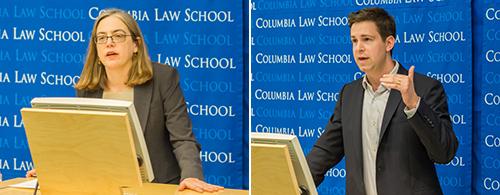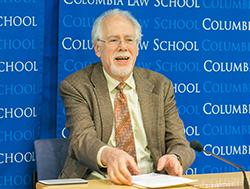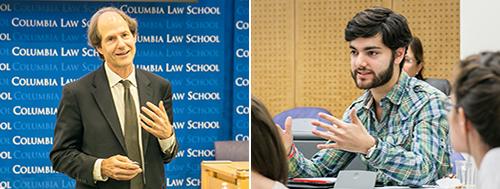Administration in an Age of Political Dysfunction
Columbia Law School's Center for Constitutional Governance Explores America's Political Polarization at Third Annual Conference
New York, April 30, 2015—Intense polarization and partisanship in U.S. politics are reshaping American governance and the separation of powers, said top academics and federal officials at the Center for Constitutional Governance’s third annual conference, held at Columbia Law School April 13.
Gillian E. Metzger, Stanley H. Fuld Professor of Law and faculty director of the center, introduced the conference, “Administration in an Age of Political Dysfunction,” and moderated a panel examining how contemporary scholarship approaches polarization in the U.S. political system. Princeton University political scientist Nolan McCarty and New York University Law School professor Richard Pildes talked about how congressional gridlock can create significant policy uncertainty that tempts other elements of the federal government to assert authority while Columbia Law School Professor David Pozen discussed his scholarship placing the Obama administration’s expansive executive actions in the context of “constitutional self-help.”
| Professor Gillian E. Metzger, faculty director of the Center for Constitutional Governance, introduces the conference, left; and Professor David Pozen discusses his scholarship on the Obama Administration's "constitutional self-help." |
“The administration has expressed a coherent philosophy of constitutional self-help, or the notion that it is acting to restore long-standing constitutional norms,” Pozen said, pointing to executive actions and statutory interpretations on issues including immigration, conflicts overseas, recess appointments, and No Child Left Behind. “We’ve seen the conjoining of an aggressive interpretive stance with the argument that legislative dysfunction justifies expanded executive power.”
| Professor Peter L. Strauss shares his extensive expertise on administrative law. |
The panel continued with an array of penetrating questions from the audience, including Columbia Law School Professors Peter L. Strauss and Jeffrey N. Gordon and Matthew B. Danzer ’15. Later in the day, Professor Olatunde Johnson moderated a panel on the realities of administration. Speakers included Serena Hoy, senior counselor to the deputy secretary at the Department of Homeland Security, Scott Sargrad, a Deputy Assistant Secretary at the Department of Education, and Boris Bershteyn, former acting administrator of the federal Office of Information and Regulatory affairs and general counsel of the U.S. Office of Management and Budget. They spoke candidly of the challenges polarization poses for agencies and about their efforts to fulfill their professional obligations to the American people while remaining on firm legal footing.
The conference concluded with a keynote address from Cass Sunstein, a Harvard University professor and former administrator of the Office of Information and Regulatory Affairs, who argued that the current levels of partisanship and “partyism” in government make delegation to the executive branch critical to ensure effective governance.
The Center for Constitutional Governance at Columbia Law School is a non-partisan legal and policy organization devoted to the study of constitutional structure and authority. It provides a forum for the discussion of constitutional issues and governance challenges across all sectors—academia, government, nonprofit, and private practice. The conference was made possible due to the generous support of the John Gorham Palfrey Memorial Lectureship Fund.
| Cass Sunstein, former administrator of the Office of Information and Regulatory Affairs, discusses his perspective on effective governance, left; and Matthew B. Danzer '15 poses a question from the audience. |


